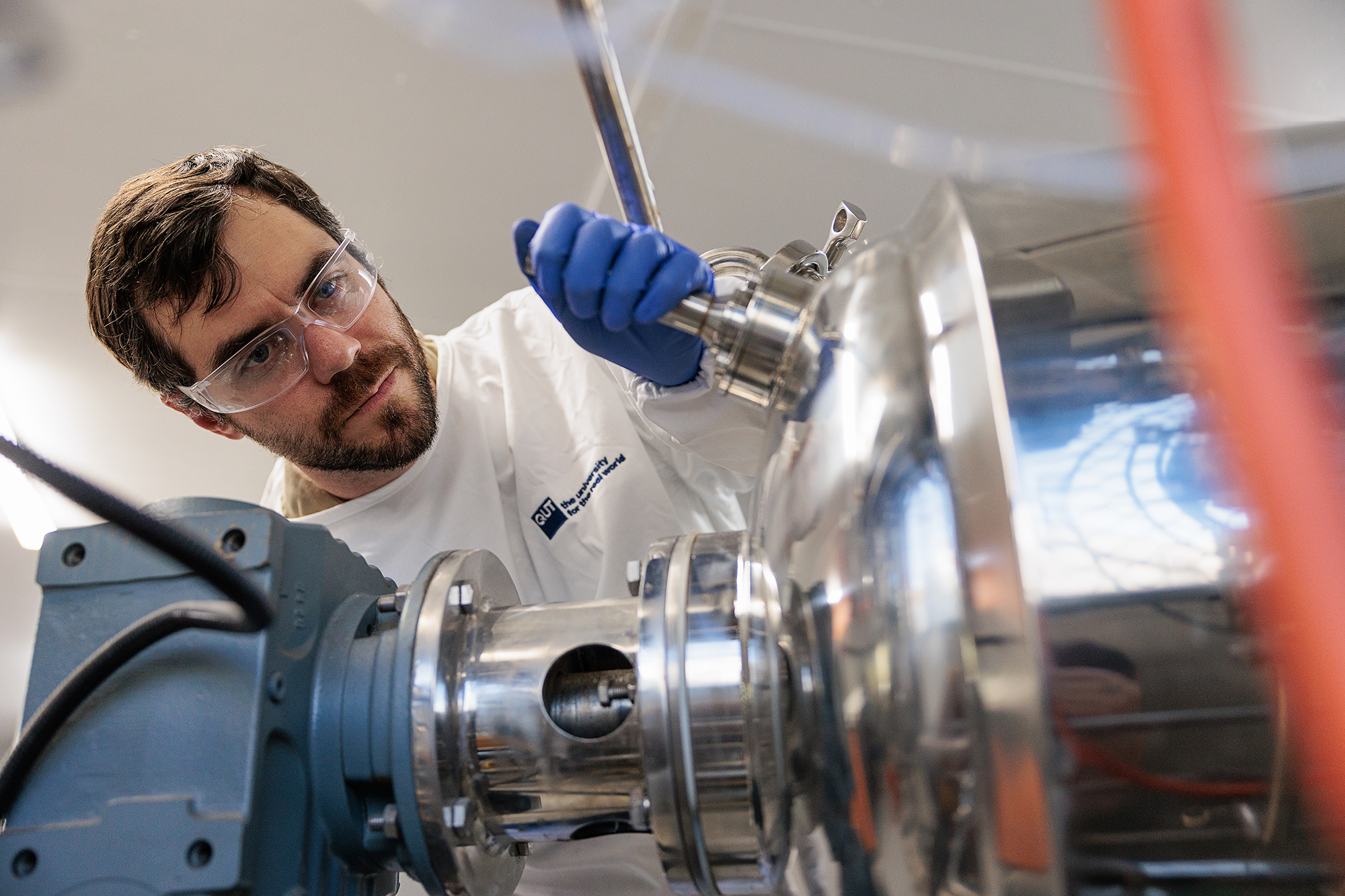A $3.9 million project will complete the transformation of the QUT Mackay Renewable Biocommodities Pilot Plant (MRBPP) into a state-of-the-art food-grade compliant facility which will enhance Australia’s ability to produce novel food ingredients.
Professor Ian O’Hara, who led the development of the Mackay Renewable Biocommodities Pilot Plant (MRBPP) more than a decade ago, said the co-investment between QUT and Australia’s Food and Beverage Accelerator (FaBA) would significantly expand the facility’s capability and allow companies to fast-track product development in the food and beverage sector.
“This project is part of an overall $16 million upgrade to the facility to be completed this year which will transform the pilot plant into Australia’s leading physical containment level 2 (PC2) large scale food-grade research translation facility,” Professor O’Hara said.
“This will enable the production of novel food and beverage ingredients via precision fermentation and boost product development by providing a unique capability to undertake early-stage scale-up, reducing cost and timeframes for getting new products to market.
“Precision fermentation allows us to manufacture new high-value food ingredients like proteins that can boost our bioeconomy in Australia and provide new domestic and export opportunities for our agricultural and food and beverage industries.”
The QUT research team involved in the project includes Professor O’Hara, Professor Jolieke van der Pols, Associate Professor Mark Harrison and Dr Jo Blinco.
Precision fermentation is a technology that allows us to convert sugars into a range of other food ingredients and products in brewery-style fermentation tanks.
Unlike traditional fermentation, which is used to make products such as beer and yoghurt, precision fermentation tunes the microorganisms to produce specific enzymes, fats or proteins and allows us to do this at large scale.
“The advantages of precision fermentation are that it can lead to new food products and ingredients that are not possible to produce through traditional methods, providing sustainability benefits and increasing consumer choice” Professor O’Hara said.
“Australia has many of the ingredients for a successful precision fermentation ecosystem,” Professor O’Hara said.
“However, while we have the expertise, regulatory and business environment, and position in the Asia-Pacific region, the industry is being severely constrained by a global lack of scale-up infrastructure.

Dr Chris Downs, FaBA Director, said the Accelerator had invested in the pilot plant to enable industry to scale and ensure on-shore production of innovative ingredients.
“The pilot plant has the potential to help cement Australia’s position as a leader in the development of ingredients from precision fermentation,” Dr Downs said.
“FaBA is delighted that we can invest with QUT to deliver this necessary infrastructure to help grow Australia’s food and beverage sector.”
Professor O’Hara said QUT’s greatest contribution to future foods globally could be realised across the Asia Pacific region where demand for food is projected to double between 2007 and 2050.
“With limited global precision fermentation capability in the Asia Pacific region, the FaBA investment in the MRBPP presents an enormous opportunity for QUT, Queensland and Australia.”
“The challenges we face to grow more food and produce more energy for a growing population while dramatically reducing carbon emissions are immense.”
QUT also has a role as a leading infrastructure, research and development alliance partner across the entire FaBA program, with Professor Jolieke van der Pols the Co-Deputy Lead of FaBA’s Innovative Ingredients Program.
“The use of precision fermentation for production of food ingredients is one of the most exciting developments in food innovation in recent years,” Professor van der Pols said.
“At QUT, we are at the forefront of being able to produce these novel products at scale. It is wonderful that this is now underpinned by funding from the FaBA Trailblazer Program.
“We will continue to work closely with our industry partners to help take products to market nationally and internationally.”
FaBA is hosted by The University of Queensland, in collaboration with partners QUT, the University of Southern Queensland and UniQuest. It is supported by the Australian Government’s Department of Education through the Trailblazer Universities Program.
Federal Assistant Minister for Education, Senator Anthony Chisholm, said FaBA’s investment in the facility would enable the industry to achieve its aim of doubling the value of Australia’s food and beverage manufacturing sector by 2030.
“FaBA is just one of our innovative projects that invest in new industry opportunities under the Australian Government’s $370.3 million Trailblazer Universities Program,” Assistant Minister Chisholm said.
“Investing in the QUT Mackay Renewable Biocommodities Pilot Plant won’t just boost the local economy by fostering new high-tech and sustainable manufacturing industries, it will also provide an opportunity to the local workforce in Mackay to upskill and reskill.
“New ingredients such as nutritionally valuable proteins and oils will not only give Australian consumers more choice on the supermarket shelf, they’ll also be better for the environment and made right here in Australia.”
In addition to the investments by QUT and FaBA, the Mackay Pilot Plant upgrade is being supported by the Australian and Queensland Governments through the Regional Recovery Partnerships Program and the Queensland Government Department of State Development and Infrastructure through the Industry Partnership Program.
Assistant Minister for State Development and Infrastructure and Member for Mackay, Julieanne Gilbert, said the Queensland Government was investing in Mackay’s economic future.
“The Miles Government’s $415.5 million Industry Partnership Program is growing industries and local jobs in regional Queensland through projects like this one,” Ms Gilbert said.
“The Mackay Pilot Plant upgrade will help unlock the region’s potential as a leader in Queensland’s growing biofutures sector.
“With our unique strengths in agriculture and manufacturing, including a rich supply of feedstock, Mackay is in a strong position to capitalise on growing global demand for bio-products.”








